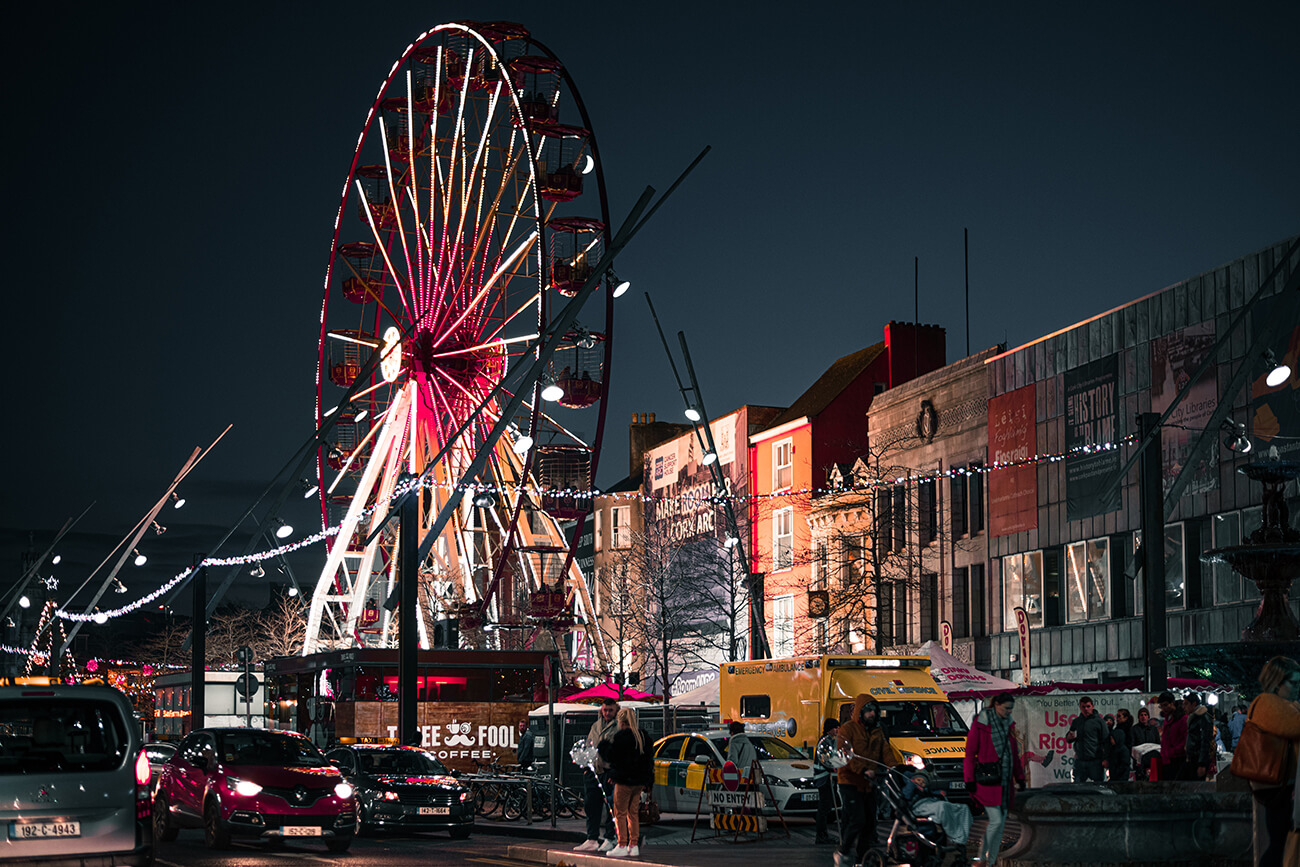Cork is the second-largest city in Ireland (208,670 people), located in the south-west of the country. It’s also a university city with 35,000+ students, a vibrant tourist center, the European Capital of Culture for 2005, Europe’s friendliest city according to Condé Nast, and home to over one hundred technology companies.

IT salaries
The average IT salary in Cork is about €60,000 – 70,000 per year or €5,000 – 5,800 per month depending on the specialization and experience.
Here are average annual IT salaries in Cork (€, before taxes) according to Morgan McKinley:
- AI / machine learning specialist: 85,000 (60,000 – 110,000)
- Android developer: 55,000 (45,000 – 70,000)
- Big Data developer: 80,000 (60,000 – 100,000)
- Business analyst: 55,000 (45,000 – 70,000)
- C# developer: 60,000 (45,000 – 70,000)
- Cloud architect: 85,000 (70,000 – 100,000)
- Data analyst: 55,000 (40,000 – 70,000)
- Data scientist: 70,000 (55,000 – 85,000)
- DevOps engineer: 80,000 (60,000 – 100,000)
- Full-stack developer: 60,000 (50,000 – 75,000)
- iOS developer: 55,000 (45,000 – 70,000)
- IT manager: 80,000 (65,000 – 100,000)
- Java developer: 60,000 (45,000 – 70,000)
- JavaScript developer: 55,000 (40,000 – 70,000)
- .NET developer: 60,000 (45,000 – 70,000)
- Network engineer: 65,000 (50,000 – 80,000)
- PHP developer: 55,000 (40,000 – 65,000)
- Product manager: 75,000 (65,000 – 90,000)
- Product owner: 65,000 (55,000 – 75,000)
- Python developer: 60,000 (45,000 – 70,000)
- QA engineer: 60,000 (45,000 – 75,000)
- React developer: 60,000 (45,000 – 75,000)
- Ruby on Rails developer: 55,000 (45,000 – 70,000)
- Salesforce developer: 75,000 (60,000 – 90,000)
- Scrum master: 70,000 (60,000 – 80,000)
- Security engineer: 65,000 (50,000 – 75,000)
- SQL developer: 55,000 (45,000 – 70,000)
- Systems analyst: 55,000 (45,000 – 70,000)
- Technical writer: 50,000 (35,000 – 60,000)
- UX/UI designer: 60,000 (40,000 – 75,000)
Economy
Cork is Ireland’s important economic center and a large technology hub boasting one of the highest concentrations of ICT activity within the OECD (Organization for Economic Cooperation and Development).
The unemployment rate in Cork is 3.7% — lower than the average of 5.4% across the nation (April 2020).
Important economic sectors in Cork include:
- Brewing
- Cybersecurity
- ICT (information and communications technology)
- Internationally Traded Services
- Manufacturing
- Media
- Nanotechnology
- Pharmaceutical industry
- R&D
- Retail
There are over 150 technology companies present in Cork. They employ almost 39,000 people overall, of which more than 14,000 are employed by international technology companies based in the city. They are particularly active in cybersecurity, artificial intelligence (AI), internet of things (IoT), software as a service (SaaS), MedTech, and enterprise solutions. Other popular industries include AgriTech, eCommerce, EduTech, entertainment/sports, green energy, HealthTech, industrial technologies, and social media and advertising.

Moreover, Cork is home to CoderDojo (programming workshops for young people) and I Wish (Inspiring Women in STEM) as well as to the Tyndall Institute (Ireland’s largest ICT research center) and Nimbus (Ireland’s largest dedicated IoT center).
The most popular technology companies present in Cork include:
- Amazon
- Apple
- Dell EMC
- Logitech
- McAfee
- Siemens
- Solarwinds
- Teamwork
- VMware
Cost of living
The average monthly expenses in Cork stand at about €840 for a single person or €3,000 for a four-person family (without rent).
Here are examples of the average prices in Cork (€):
- Meal at McDonald’s: 8–9
- Meal at another inexpensive restaurant: 12–28
- Average food basket (milk, bread, eggs, cheese, chicken, apples, potatoes, water, beer): 32
- Monthly fee at a fitness club: 30–60
- Monthly pass: 75–100
- Monthly rent (1 bedroom): 800 – 1,450
- Monthly rent (3 bedrooms): 1,300 – 2,500
- Property prices per square meter: 2,000 – 4,800
- Utilities: 100–250 per month
Travel
Cork Airport is the second busiest airport in Ireland after Dublin Airport. Cork Airport allows easy access to continental Europe, namely to such cities as Amsterdam, Budapest, Gdańsk, Lisbon, Madrid, Paris, Poznań, Wrocław, and others.
Entertainment
Cork has a vibrant cultural life, with a number of music and dance venues, literary community centers, museums, and art galleries. Architecture enthusiasts would love Cork’s cathedrals as well as its medieval and Georgian buildings.